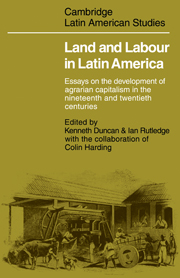 Land and Labourin Latin America
Land and Labourin Latin America Book contents
- Frontmatter
- Contents
- List of tables
- List of figures
- List of maps
- Acknowledgements
- 1 Introduction: patterns of agrarian capitalism in Latin America
- PART I THE TRANSITION FROM TRADITIONAL HACIENDA TO CAPITALIST ESTATE
- PART II THE DEVELOPMENT OF A PLANTATION ECONOMY WITH LABOUR RECRUITMENT FROM HIGHLAND PEASANT COMMUNITIES
- PART III THE DEVELOPMENT OF COMMERCIAL AGRICULTURE USING EUROPEAN IMMIGRANT LABOUR
- PART IV THE TRANSITION FROM SLAVE PLANTATION TO CAPITALIST PLANTATION
- 14 The consequences of modernization for Brazil's sugar plantations in the nineteenth century
- 15 From banguê to usina: social aspects of growth and modernization in the sugar industry of Pernambuco, Brazil, 1850–1920
- 16 The evolution of rural wage labour in the Cauca Valley of Colombia, 1700–1970
- 17 The post-emancipation origins of the relationships between the estates and the peasantry in Trinidad
- PART V POSTSCRIPT
- Glossary of Spanish and Portuguese terms used in the text
- Weights and measures
- Notes on contributors
- Indexes Subjects
- Authors
17 - The post-emancipation origins of the relationships between the estates and the peasantry in Trinidad
Published online by Cambridge University Press: 07 May 2010
- Frontmatter
- Contents
- List of tables
- List of figures
- List of maps
- Acknowledgements
- 1 Introduction: patterns of agrarian capitalism in Latin America
- PART I THE TRANSITION FROM TRADITIONAL HACIENDA TO CAPITALIST ESTATE
- PART II THE DEVELOPMENT OF A PLANTATION ECONOMY WITH LABOUR RECRUITMENT FROM HIGHLAND PEASANT COMMUNITIES
- PART III THE DEVELOPMENT OF COMMERCIAL AGRICULTURE USING EUROPEAN IMMIGRANT LABOUR
- PART IV THE TRANSITION FROM SLAVE PLANTATION TO CAPITALIST PLANTATION
- 14 The consequences of modernization for Brazil's sugar plantations in the nineteenth century
- 15 From banguê to usina: social aspects of growth and modernization in the sugar industry of Pernambuco, Brazil, 1850–1920
- 16 The evolution of rural wage labour in the Cauca Valley of Colombia, 1700–1970
- 17 The post-emancipation origins of the relationships between the estates and the peasantry in Trinidad
- PART V POSTSCRIPT
- Glossary of Spanish and Portuguese terms used in the text
- Weights and measures
- Notes on contributors
- Indexes Subjects
- Authors
Summary
In 1848, nearly fifteen years after the abolition of slavery, Lord Harris, the governor of Trinidad, declared in a dispatch to the Colonial Office that ‘a race had been freed, but a society had not been formed”. Harris was recognizing that although fundamental changes had been wrought in the basic rights of the black population ‘little attention had been paid to any legislation having for its end the formation of a society on true, sound and lasting principles’. The abolition of slavery had established a constitutional setting in which economic and social progress for the bulk of the population was now possible, but abolition alone could not promote that progress.
The abolition of slavery did not dissolve vested interests, established patterns of thought, or the unchallenged place of plantation owners and shareholders at the top of the hierarchy. Freedom in its basic sense did not mean for the black population freedom from the pressures and established advantages of a socio-economic system marked by massive gulfs in the distribution of wealth and privilege. Furthermore the termination of slavery did not itself bring about immediate changes in agricultural practices. The period of apprenticeship (1834–8) held the former slaves to the estates, and when release came the labouring population moved away from the plantations over a period of years. In Trinidad it would appear that labour shortages on the plantations did not become acute until the early 1840s.
As the labouring population moved off the plantations and began to establish itself as an independent peasantry it had to compete, within the framework of colonial society, with the established interests which had long controlled agriculture and land ownership.
- Type
- Chapter
- Information
- Land and Labourin Latin AmericaEssays on the Development of Agrarian Capitalism in the nineteenth and twentieth centuries, pp. 435 - 452Publisher: Cambridge University PressPrint publication year: 1978
- 2
- Cited by


